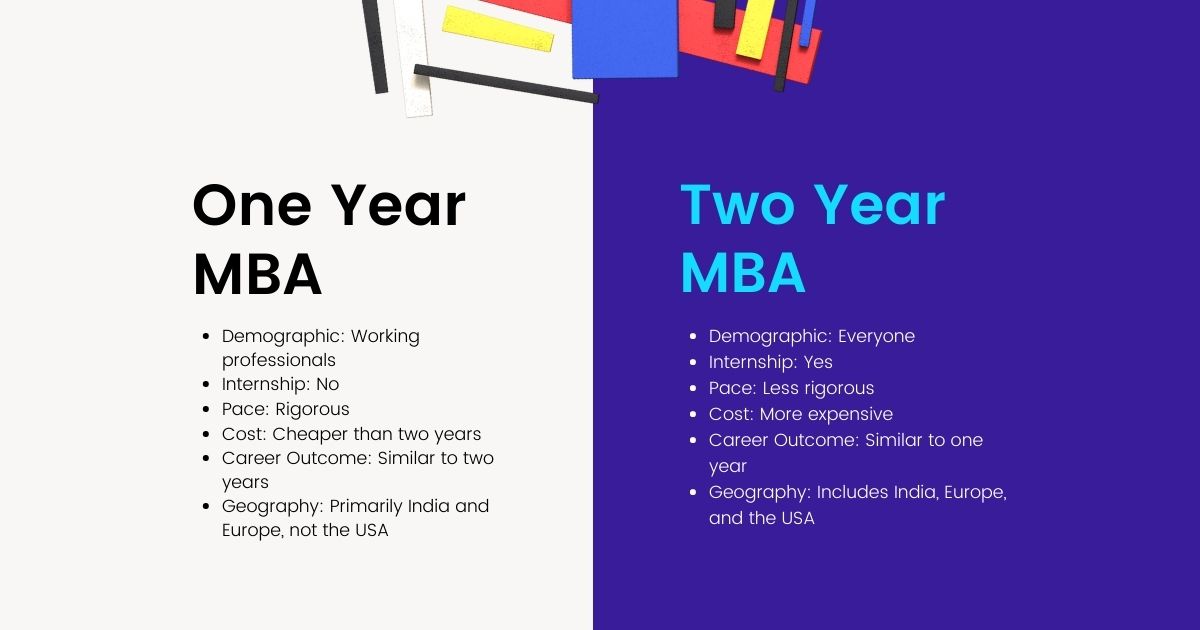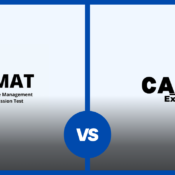
1-year Vs 2-year MBA Programs – Which should you choose?
One or two-year MBA is a dilemma faced by many MBA aspirants, whether they are considering a business school or are in the middle of their GMAT preparation. We are here to simplify this issue for you, by bringing to light a multitude of factors you must consider before coming to a conclusion.
Here’s all you need to know before you make a career-altering decision of pursuing a business degree.
1. Geography counts
This means, if your target country is the USA, then they primarily have two-year MBA courses, except a handful of schools like Kellogg, USC Marshall, Cornell Johnson, Katz Pittsburg, Mendoza, and Notre Dame, among a few more. If you do not want to invest two years, it is better to consider European business schools, as you will find plenty of options offering one-year courses. An exception to this is the London School of Business, but even they do not stretch it out to two years.
2. Brand name
If you are getting admission to a tier 1 European school and a tier 3 USA program, then the duration of the program becomes irrelevant. The same holds true in the opposite case as well. Also, if you are getting admission in two years MBA program and one year MBA program in the US, it makes sense to go for the former, as a two-year degree is the norm in the US.
3. Job prospects
In top Indian business schools, like the IIMs or ISB, top corporates arrive on campus to recruit the top candidates. In fact, there is also a rising trend of picking business schools basis the company that comes for recruitment. However, campus placement is not the norm for business schools outside India. You need to find out for yourself and get your job. Then what will help you? One word: network (also read: how to network effectively). It is crucial you network well to land a job of your choice. If you want an MBA outside India, then two years is better suited for extending networking opportunities. Also, a two-year program provides a 10 to 12-week summer internship opportunity which is a golden opportunity to impress upon a potential employer.
4. Work experience
If you are someone with over 8 to 10 years of experience, you should look at a 1-year MBA. Anyone who has lesser experience should ideally go for a two-year program. However, this rule is not set in stone, and will vary from one person to another. 1 year MBA does not have internship opportunities because it is designed for professionals who are already in the workforce.
Recommended read:
MBA Applications: Round 1 vs Round 2 vs Round 3
5. Time commitment
When opting for a particular course, be mindful that it calls for time off from the workforce. This can have different kinds of impacts on different people. Be it for personal or professional reasons, some people hesitate to stay away for two years. However, in many cases, the salary paid to one and two-year MBA graduates is relatively the same.
All in all:
| Duration | Demographic | Internship | Pace | Cost | Career Outcome | Geography |
| 1 year | Working professionals | No | Rigorous | Cheaper than two years | Similar to two years | Primarily India and Europe, not the USA |
| 2 years | Everyone | Yes | Less rigorous | More expensive | Similar to one year | Includes India, Europe, and the USA |
The pros and cons of 1 year MBA program:
- Majority of 1 year MBA programs are relatively less expensive when seen internationally.
- Salary loss/opportunity cost is less in one year program.
- One year does not provide much time to learn as the pace is extremely intense, which can be an issue if it is something you are not accustomed to.
- You will be extremely caught up in the 10–12-month MBA program that you will not have time to network. This is a con for people who go to business schools specifically for experience.
The pros and cons of 2-year MBA program:
- Learning is relaxed, and you can pace it as per your comfort.
- You will be able to do more internships and research projects with your professor along with your studies.
- It will give you breathing space to immerse in multiple offerings during the program.
- It takes more time, that is, two years.
- It can get more expensive, not just in terms of fees but living expenses as well.
Which one should you pick?
To answer this, you have to ask yourself a few questions. First, what is your professional experience both in terms of quantity and quality? If you are an established professional who has taken on leadership roles within business verticals a 1-year MBA maybe better suited for your professional career development. The second parameter is, which region do you want to work in? Let’s say you want to work as an investment banker in New York, then it does not make any prudent sense for you to do your MBA from Oxford, London Business School, Cambridge, etc. This is because shifting your base to New York is going to get extremely difficult after that. Graduating from a local school will have significantly more impact. The third parameter is the financial cost as the total cost of attendance for a 1 year program will be 30-40% lesser than a conventional 2 year MBA program.
All in all, neither program is better than the other. Choosing a one- or two-year MBA is entirely a product of your current situation, your future ambition, and your career path. While some may be suited for a 1-year MBA program, others will fit better in a 2-year MBA program.



